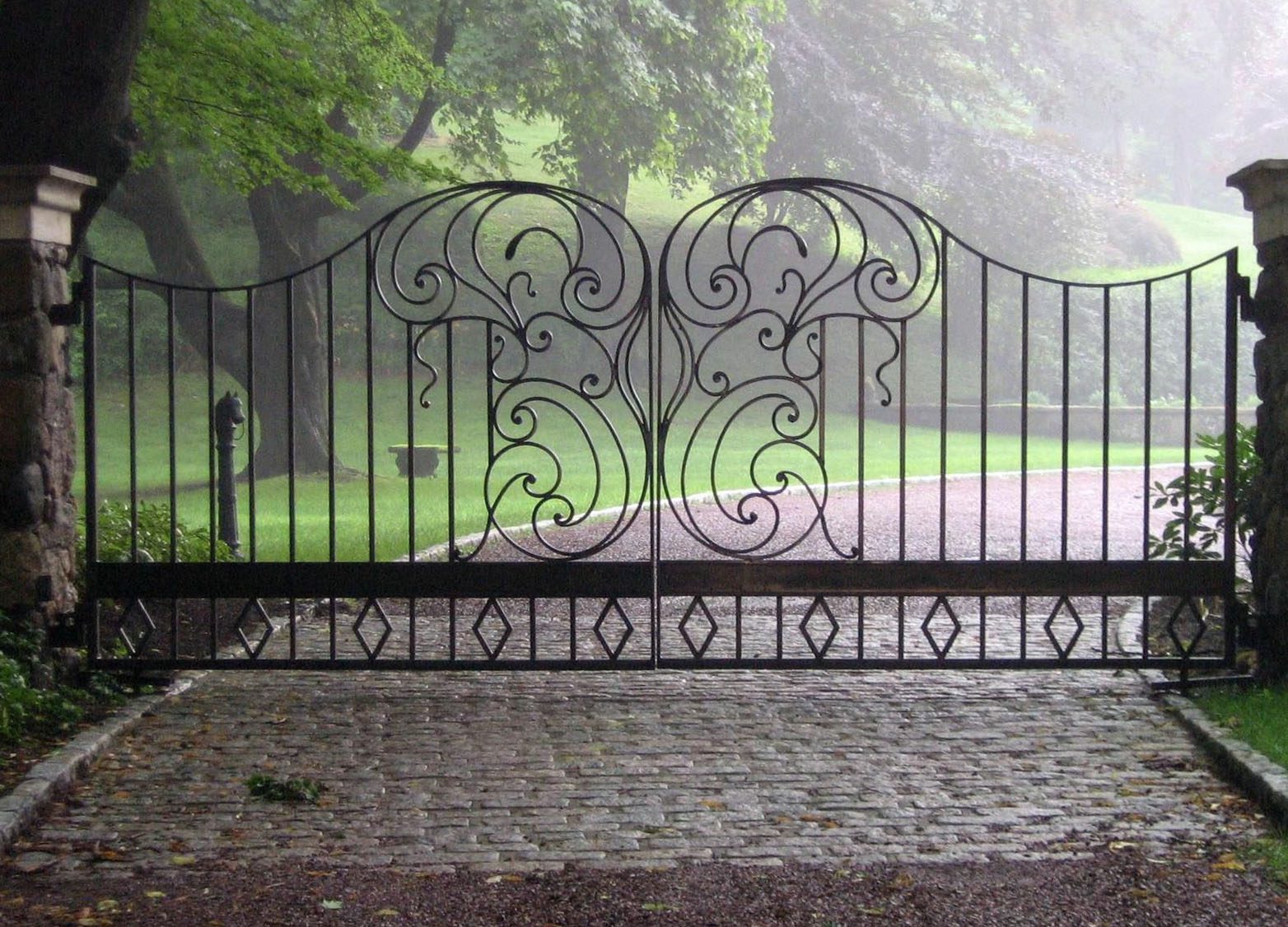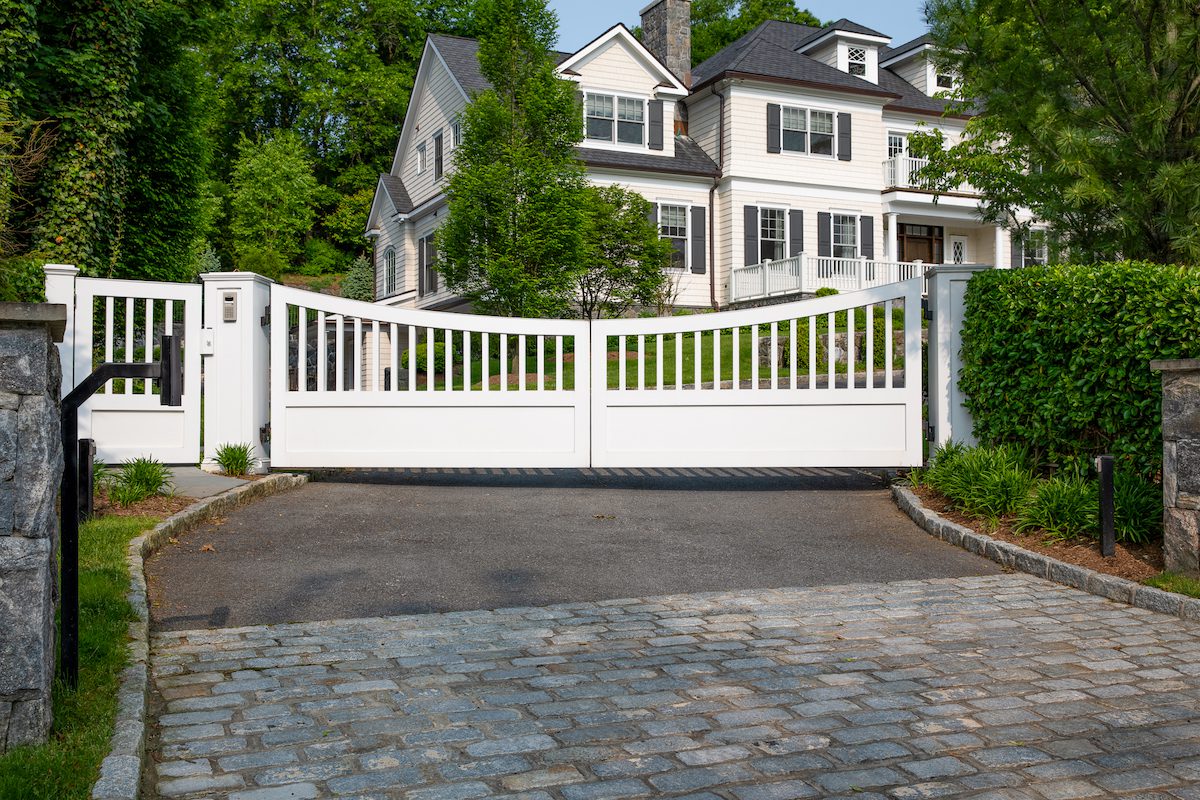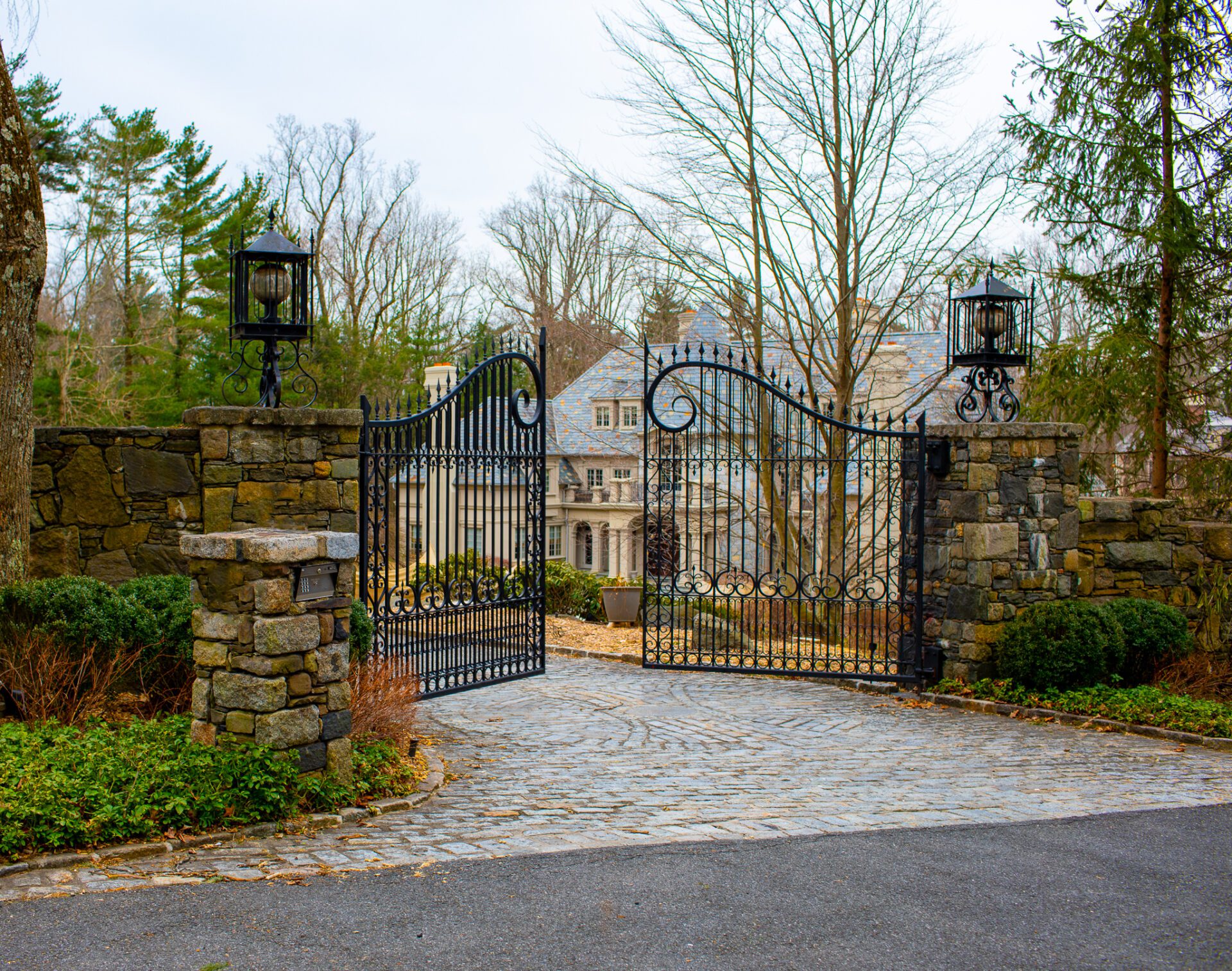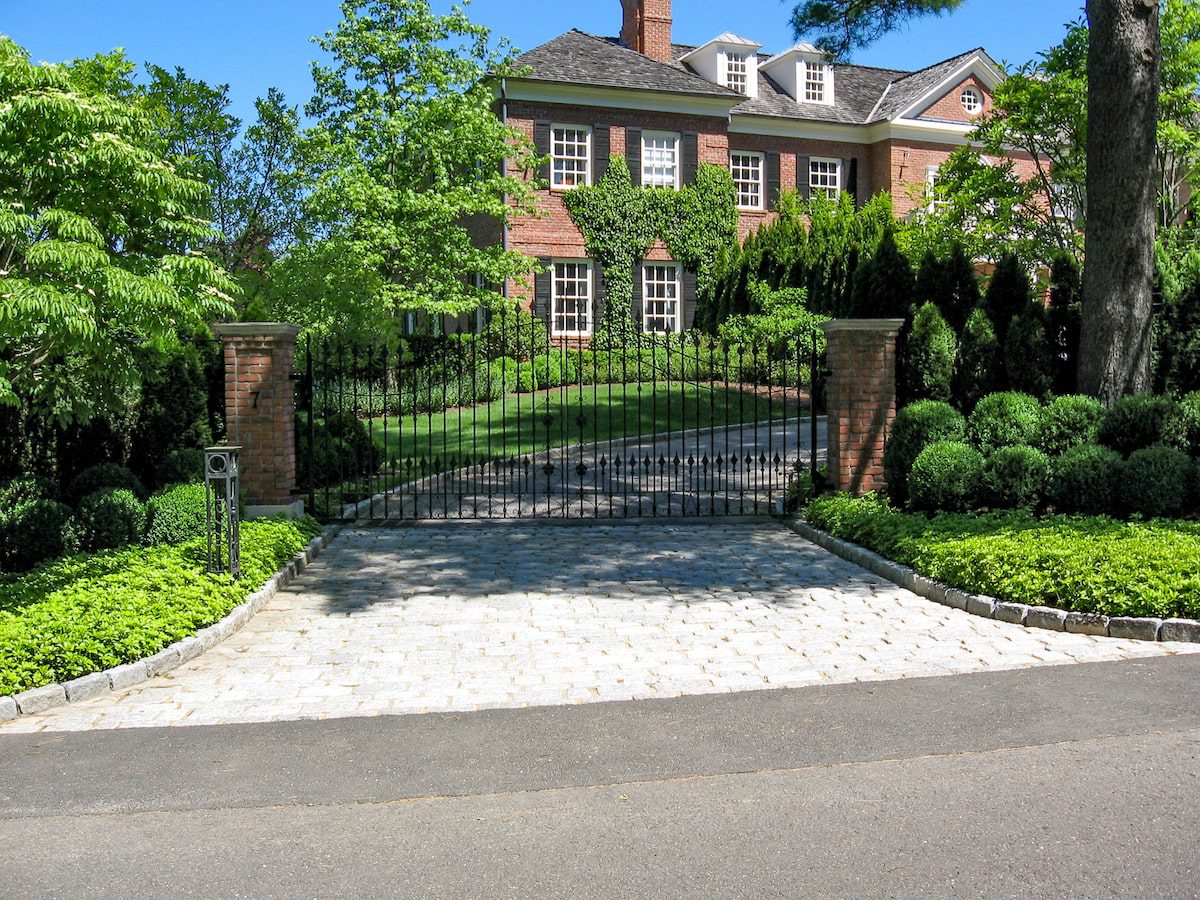Wood Driveway Gates: Privacy, Warmth, and Natural Beauty
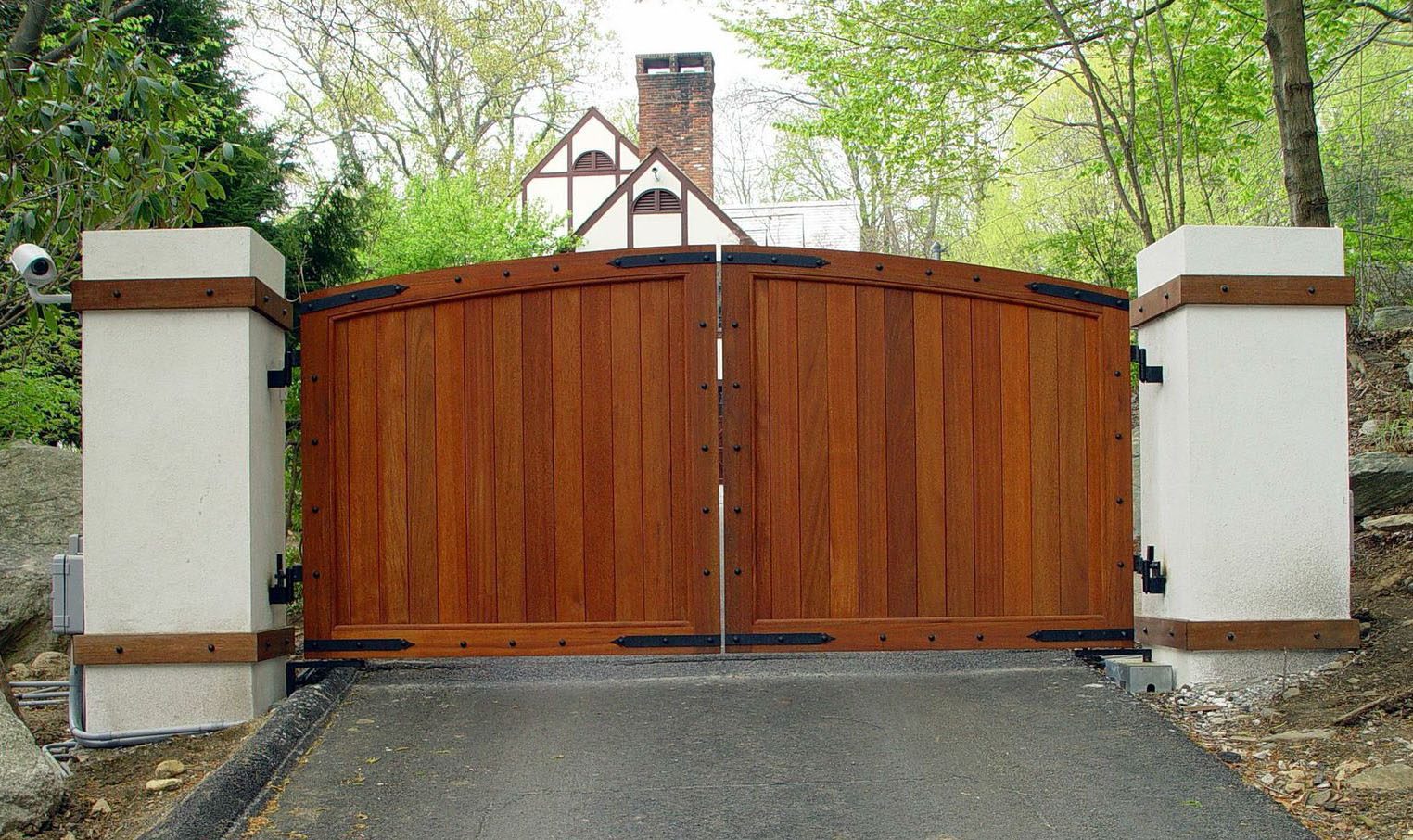
Wood gates are ideal if you’re seeking privacy and a warm, natural look. When fabricating wooden driveway gates, we start with a sturdy steel frame and wrap it with western red cedar, mahogany, or Brazilian ipe. Here are some key factors to consider:
Appearance – Wood has a welcoming feel and ages gracefully. Over time, wood gates can take on an earthy, weathered tone that adds character. At Tri State Gate, our go-to wood is select-grade clear western red cedar, which ranges in color from mellow ambers to reddish cinnamons. Mahogany is an even stronger wood with a rich, reddish-brown color and nice grain patterns; we use it on request. We also work in Brazilian ipe, nicknamed “Ironwood” for its durability. Generally, wood gates are painted with one coat of primer and two coats of finish for any standard outdoor paint color. (You can provide us with the exact color formula; paint from Sherwin Williams or Benjamin Moore is preferred.) Staining is a great option for higher-grade woods as it accentuates the natural grain of the material. You can also leave your gates unstained or painted, in which case they’ll slowly age over the years into a natural gray color.
Maintenance – Cedar, ipe, and mahogany are all known for their longevity. Cedar resists warping, twisting, and checking better than many other wood species, and it contains natural oils that help resist rot and insect damage. Mahogany (being a harder wood) resists rot even better. Ipe is one of the densest hardwoods around – so much so that it has a Class A fire rating, the same rating given to concrete and steel. Wood gates typically need to be painted and stained every 5-7 years, or about as often as you paint your house. This maintenance isn’t required, however, if you leave them unstained.
Privacy – Wood inherently offers more privacy than metal. When looking at a wood gate (regardless of style), your eye naturally stops at the gate. In comparison, the open design of most metal gates encourages you to look beyond. To ensure structural integrity and privacy over time, we typically fabricate vertical wood panels using tongue and groove construction. Unlike with simple board-on-board construction, in which spaces can form between panels due to natural expansion and contraction caused by weather, with tongue and groove construction any gaps are hidden by the “tongue” extending out past the board.
Environmental Friendliness – Our woods are sourced from sustainable farms.
Cost – Because our wooden driveway gates have a steel frame, they’re essentially two gates in one. As a result, they’re often more expensive than a basic iron gate. However, wood gates have a smaller variation in cost. Metal gates, on the other hand, offer a greater variety of design options and can get much more expensive than wood gates.
See some of our wooden driveway gate designs in our photo gallery for ideas.
Metal Driveway Gates: A Reputation for Strength and Elegance
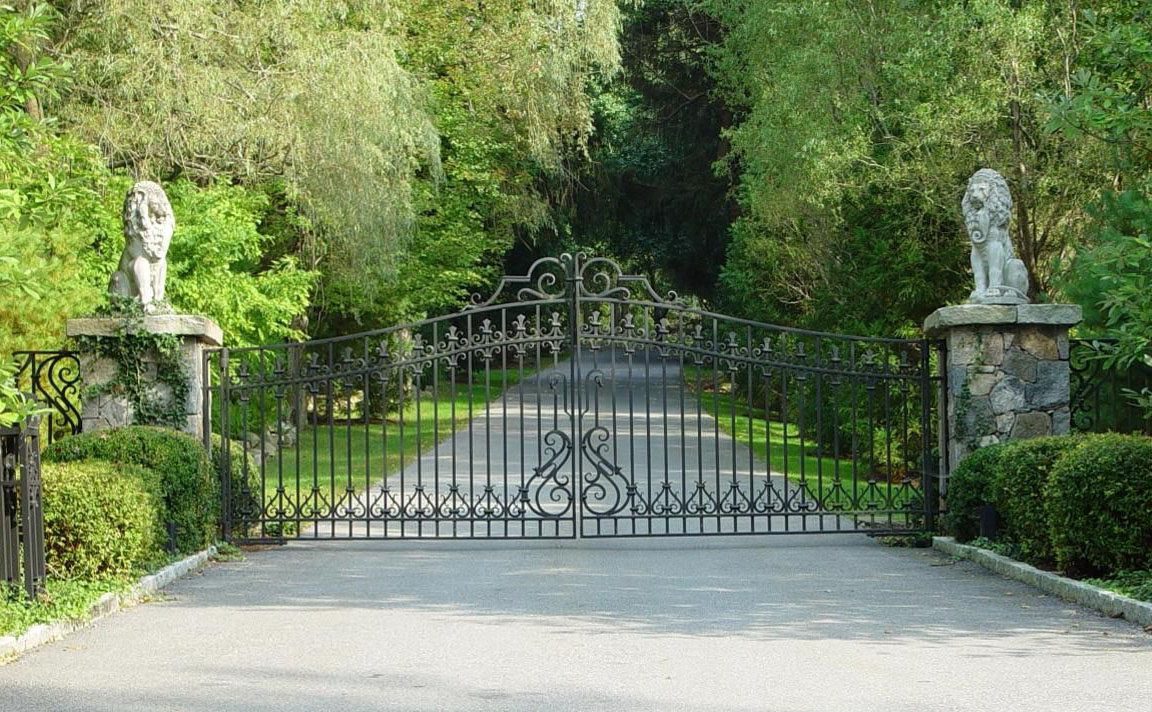
We specialize in custom-designed wrought iron, aluminum, steel, and bronze driveway gates — all meticulously crafted to complement the unique dimensions and architectural spirit of your property.
Our stainless steel gates are polished by hand in our shop to give them a reflective finish that captures the light. Aluminum gates, like stainless steel, will never rust, and can be made in a variety of styles (though most people opt for simpler, more modern designs with aluminum).
For customers who want a more classical look, we also work in bronze, which develops a dark patina with time — something that can be developed in advance before installation for customers who request it.
One of the longest-lasting materials available, wrought iron is prized for its durability. Opting for a wrought-iron driveway gate allows for a wide range of custom gate designs, from ornate loops to modern lines to unique sculptural elements. The open nature of iron gate designs is ideal if you want to showcase your property.
Appearance – Whether it’s a simple, elegant design or an elaborate custom work, an iron gate adds instant curb appeal that can boost your property’s value. The openness offers a window into your property and makes the entrance feel spacious.
Maintenance – Iron is a tough metal that can withstand heavy use and harsh conditions. When properly cared for, iron gates can last for generations. Wrought iron must be painted to avoid rusting and flaking: our wrought iron is hot dip galvanized, which adds a zinc coating to the metal that prevents oxidation, then covered with one coat of primer and two coats of finish. Like with wood, repainting is recommended every 5-7 years. Steel, aluminum, and bronze, on the other hand, are naturally resistant to rust and corrosion and therefore require slightly less upkeep.
Privacy – Most metal driveway gates don’t conceal your property, but that’s a feature, not a bug: a gate you can see through shows off your estate and allows you to easily monitor what’s happening on the other side. For homeowners who want the strength and durability of metal combined with privacy, we can fashion solid metal panel gates in wrought iron or aluminum.
Environmental Friendliness – Metals are recyclable and reusable.
Cost – Costs vary widely depending on size, customization, and your choice of metal. Iron gates with simple designs are fairly inexpensive while ornate design features can lead to significantly higher costs. Aluminum and steel are generally more expensive than wrought iron, but they also lend themselves to less ornate, more modern designs which can help keep down costs. Bronze, while the most expensive of the four, is often used for accents rather than for entire gates.
Take a look at our photo gallery of wrought-iron driveway gate designs for ideas.
Composite Gates: Eco-Friendly and Low Maintenance
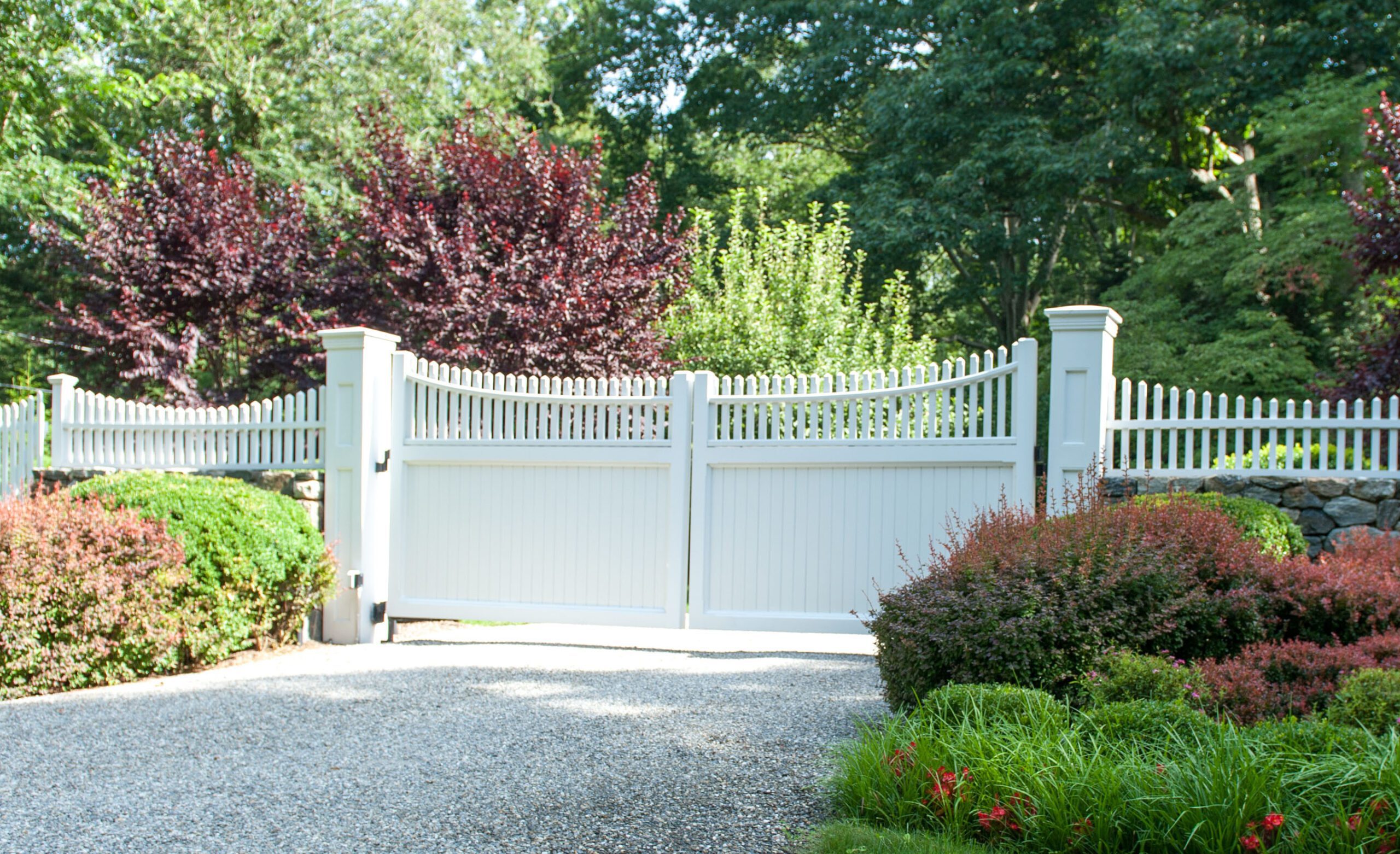
Composite gates look almost identical to wood gates but require less maintenance. This ideal scenario comes with a higher cost, but if you value low upkeep it’s a worthwhile investment.
Appearance – While wood has natural grain and composite does not, it’s almost impossible to tell the difference after both materials are painted. Composite is naturally white and must be painted – you can choose from a full spectrum of paint colors, but staining is not an option.
Maintenance – Tri State Gate’s composite gates are made from lightweight yet dense PVC material that will never rot. Unlike low-grade PVC composite, which is hollow, our composite is completely solid and built around a steel frame, making for an extremely durable and highly weather-resistant driveway entry gate.
Privacy – Similar to wood gates, more privacy can be achieved by placing the panels closer together (or go for full privacy by using tongue and groove construction). To balance a private yet open feel, consider pairing a solid tongue-and-groove bottom with a picket-style topper (as seen in the photo above).
Environmental Friendliness – No lumber needed; composite is made with recyclable materials and is highly eco-friendly.
Cost – Composite driveway gates cost more than wooden driveway gates, largely because they require more labor to construct. However, this higher up-front cost is offset by less maintenance over the life of the gate.
See some of our composite gate installations in Tri State Gate’s product gallery.
FAQs about Choosing the Best Materials for Driveway Gates
What Is the Most Secure Material for a Driveway Gate?
Our gates are all either built of metal or have metal cores underneath wood or composite that make them safe, secure, and dependable. If home security is one of your top priorities, we offer a wide range of security features that reinforce that protection. Organizations such as the FBI, the Secret Service, the United Nations, and the Department of Homeland Security have turned to us for gates to keep their properties safe.
How Long Do Driveway Gates Last?
Our gates are built to last. Gates made out of a hard wood like mahogany can last up to 50 years with regular painting, staining, and sealing every 5 to 7 years. Composite gates have a similar lifespan, though they require less maintenance over that course of time. (They do still require regular cleaning, a new coat of paint every few years, and occasional inspections for damage or everyday wear and tear.) Metal gates last the longest of all: stainless steel and aluminum are naturally resistant to rust and corrosion, and wrought iron, with proper care, can last for generations. (This wrought iron fence near the New York Stock Exchange predates the Revolutionary War.)
Does a Driveway Gate Increase Home Value?
Absolutely. A high-quality driveway gate significantly improves the value of your home by enhancing your curb appeal, bolstering your home security, and complementing the aesthetics of your house. Driveway gates are a symbol of luxury and exclusivity – they make a powerful first impression on anyone evaluating the value of your property.
Can I Paint or Stain My Driveway Gate?
Wood driveway gates can be either stained or painted depending on whether you want to show off the natural color and grain of the material. Composite gates can’t be stained, but they do need to be painted. Our wrought iron gates are hot dip galvanized to prevent oxidation then covered with primer and two coats of paint to protect them from the elements (though the paint is usually black or bronze tone to fit the material).
Which Is Better: Wrought Iron or Aluminum Gates?
Wrought iron is the most popular choice for metal gates, and for good reason: it’s durable, dependable, and highly customizable. It’s been the go-to choice for metal gates for hundreds of years, which steeps it in a long history and tradition of classical aesthetics. Also, while costs can vary based on a variety of factors, wrought iron can be customized more cost effectively than aluminum, which means you can get more unique and intricate designs at lower expense.
Aluminum, on the other hand, can offer both more privacy and a more modern look for your entry gate. Although the material costs more than wrought iron, aluminum gates won’t rust and thus require less maintenance, making them a good investment in the long run if you can manage the higher initial cost.
What Is the Ideal Driveway Gate Size?
The typical driveway gate is about 14-18 feet across. However, the total amount of space you’ll need will vary depending on whether you’re getting a swing gate or a sliding gate. Sliding gates, for instance, typically need about 150% of the entire width of your driveway available in fence space to the left or right of the driveway (for example, 30 feet on the side for a 20-foot entrance). Swing gates, on the other hand, require a certain amount of unobstructed driveway space inside the gate in order to swing inward as they open.
Let Tri State Help You Choose the Best Material for Your Driveway Gate
For over 25 years, Tri State Gate in Westchester County, NY has specialized in installing, repairing, and custom-designing automated driveway gates in communities throughout Connecticut, New York, New Jersey, and the greater New England area. Contact us or give us a call at (914) 244-0018 for more information or to request a free, on-site consultation.

